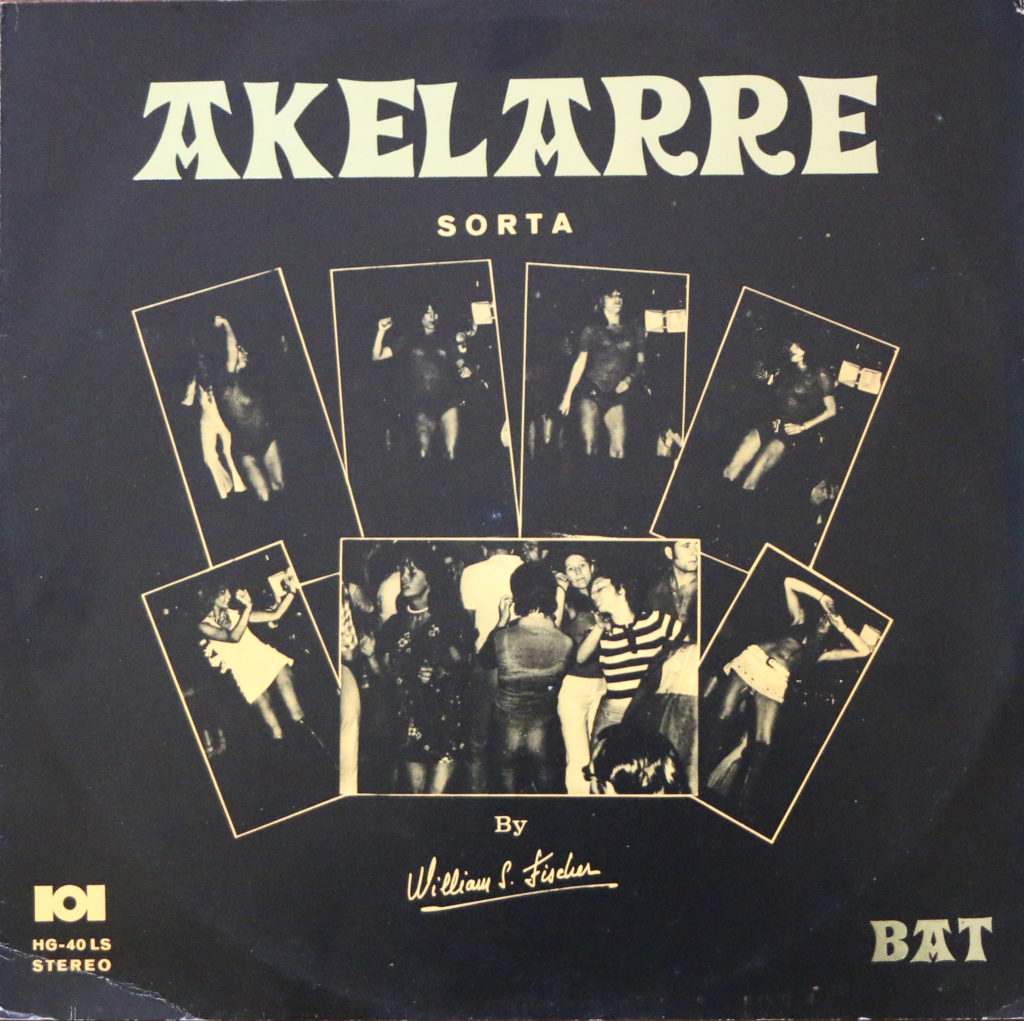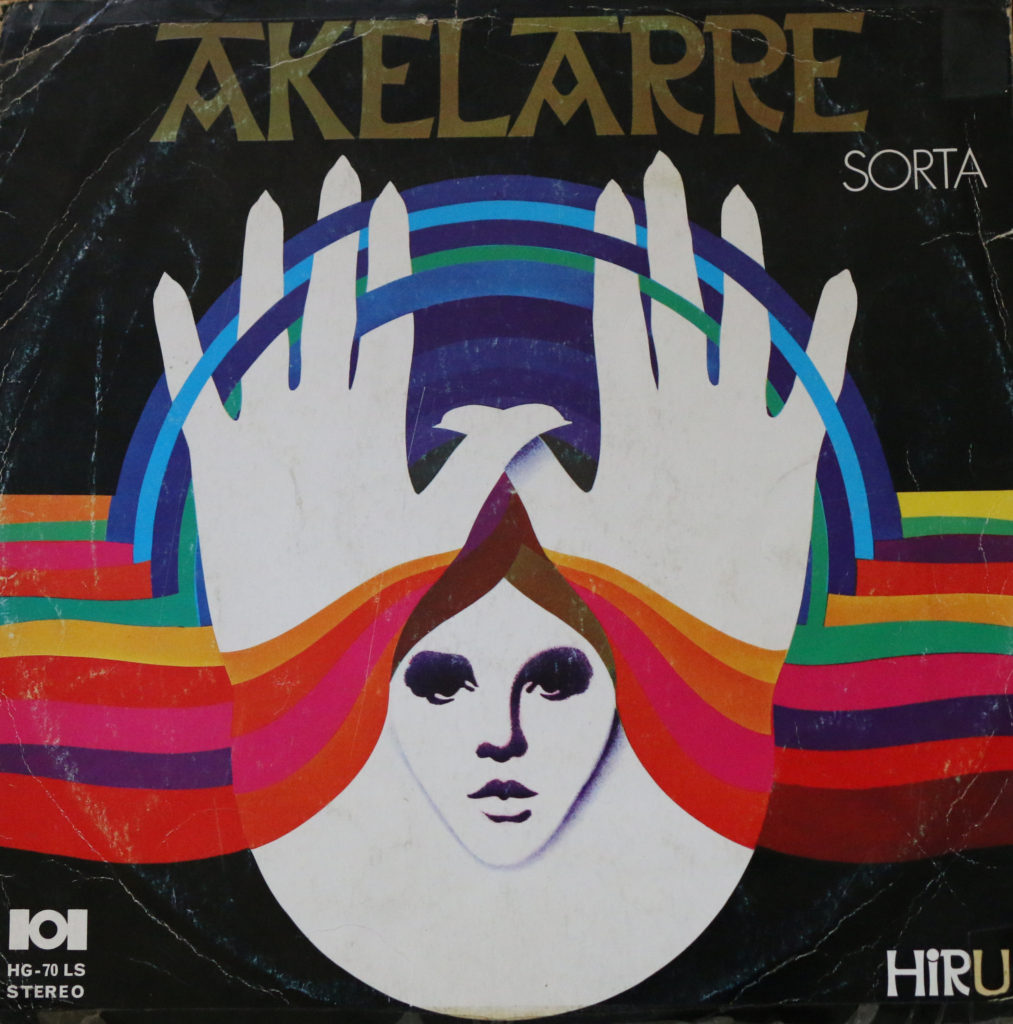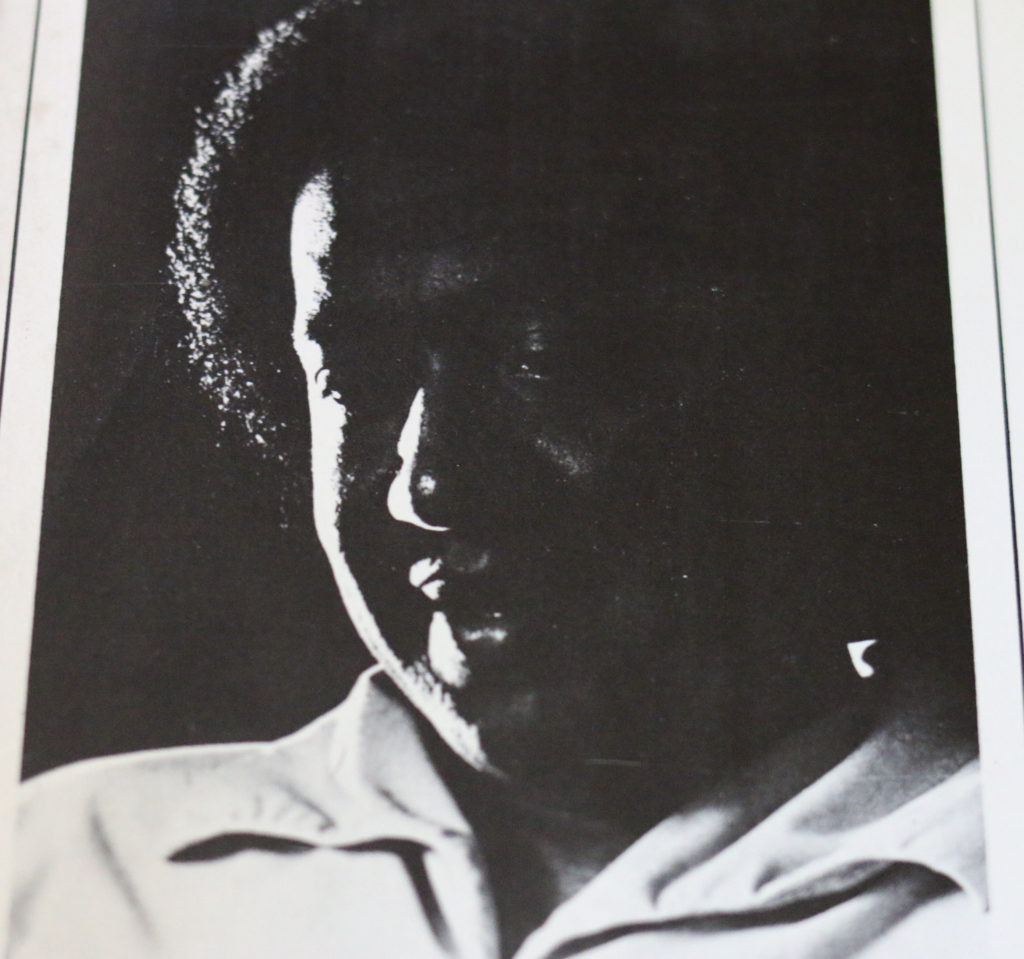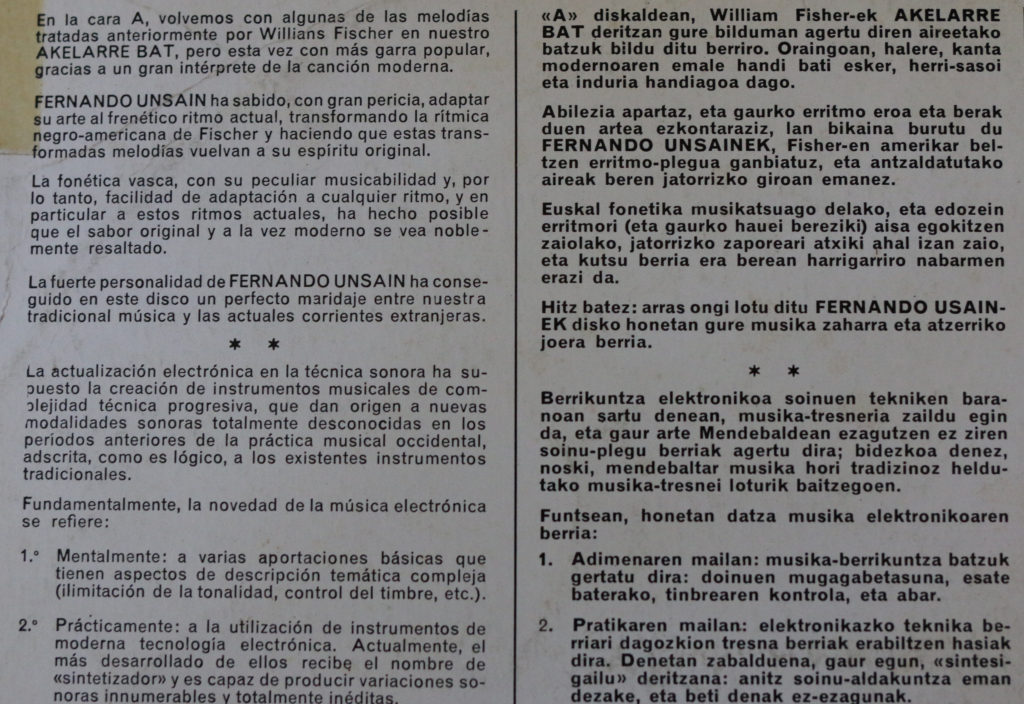
William Fischer – Bat Bi Hiru Lau
William Fischer – Bat Bi Hiru Lau (Vocal Version)
William Fischer – Eguntto Batez
William Fischer – Eguntto Batez (Vocal Version)
William Fischer – Xarmangarria
William Fischer – Xarmangarria (Vocal Version)
William Fischer – Txori Erresinula
This record is a bit of a mystery, on multiple fronts. I’m not sure where I first came into contact with it, or saw it, but I’m fairly certain after talking to him, that these recordings first came onto my radar from one of Egon’s pop-ups at Rappcats, where he was selling this version of Akelarre Sorta with its an exceptional cover.

I didn’t get the record on that day, but the distinctiveness of the cover stuck with me, and eventually I had to do some digital digging to discover more about the music on it. What I discovered quite literally blew my mind, with some seriously funky sounds along with vocals that were in the Basque language. The reason this blew my mind wasn’t even entirely because of how it all sounded, but mostly because I hadn’t realized that there were ANY recordings of music with Basque vocals during this period of time. For those not aware, during the Fascist dictatorship of Franco in Spain, regional culture/dialects, such as Catalan and Euskara were outlawed. In Catalunya, during this time, it meant that one of the only avenues where you could celebrate your culture was at matches for FC Barcelona, but the situation was even more precarious for Basque folk, particularly after ETA began their campaign. While Catalan clearly has some connection to other romance languages, sounding like a largely novel mix of Spanish, French, Italian and Portuguese, Euskara is something else entirely. It’s one of the few languages in all of Europe that is entirely unrelated to any other existing languages. I’ve only gotten a chance to dig for records in Spain a couple of times, so I’m not sure if there are more records to be found, but given all I knew of Spain’s history, I recognized that this record had to be a fairly unique thing when it was recorded and released in 1971, four years before Franco’s death and the establishment of the current democracy in the country.
But the fact this record featured vocals in Basque was only one mystery, because I soon discovered that before this album was released, there was an entirely instrumental record that was released, and the vocals were added to some of those songs. What made this mysterious was the direction of American composer/musician William Fischer.

Fischer is a bit of an enigma, not releasing a large body of work, but what records that can be found are certainly idiosyncratic. The most widely available is the avant-funk-fusion album Circles on Embryo records, recorded roughly around the same time as Akelarre Sorta. After tracking down a copy of the vocal version of these songs and then discovering that there was an entire album of instrumental material, my music obsessive mind just HAD to track that one down to.
I was lucky enough to find a pristine copy from a Basque collector in Spain by the name of Jon Navarro. He told me of how when he discovered this album in the 1990s he went understandably crazy since the melodies that Fischer employs on these wildly funky songs were all from Basque folk tunes that Navarro had grown up on. How Fischer came to know these songs, what he was doing in Spain, who he was employing as musicians on the record, all of that, remains a complete mystery.

The liner notes on the original instrumental record, which are extensive in length and in Euskara, French and Spanish (but notably not Catalan), are no help whatsoever with these mysteries (the same is the case on the later vocal version, pictured above). The name “Akelarre Sorta” more or less translates to “Witches’ Sabbath,” and the liner notes, roughly translated below into English, follow that theme but say next to nothing about the actual music.
“Satanologists, sorcerers, specialists in various forms of palingenesis, talmudists of fame, and other scholars in Sorgiñología, agree to affirm the identity between environment and music in the old akelarres. Burned some of our witches by the Roman Inquisition, the others took refuge in their underground dwellings.
A fantastic world was formed then. Sorgiñas and Basque sorcerers persecuted by the hisopazos of Pierre de Lancre, allied with a Jewish gnome travel-which was said to be a cousin of Spinoza-contacted the subterranean spirits of some blacks, cimarrones escaped from the brutal raids that our European ancestors, on behalf of of civilization, performed in Africa.
From time to time, thanks to magical formulas and ointments, they surfaced…A happy conjunction of subterranean efforts caused the fall of the Bastille…And of the old Aviraneta, it was said that he was mixed in suspicious practices.
Chaho himself was seen, several times, at night, with a black kapusai, a sack, a squadron and a map of the world, in a gorge near Itxasu, where there was a very favorable tectonic fault, trying to make contact with the crypto-sorgiñes…Three phosphorescent owl-shaped figures preceded him… and a learned fundamentalist author seriously affirms that from that strange coyunda the satanic pact that led to the creation of a particularly evil carbon sect to which Garibaldi, Rawachol, the Sorcerer of Bargota and a mysterious Russian with a beard and bowler hat. For something the reaction spoke of contubernios and hidden forces!
Today we have no doubt that psychedelic music is extremely propitious to the old goblins and that…Well, listen to the disc. And please, do not charge any possible defects in our account. At the last minute, poor Maria Zozaya, Basque witch burned in the eighteenth century, but redivizes the year 1968 thanks to the latest palingenésicas techniques of Mr. Lovecraft enimschol-kai-takos … -and we do not say any more in case someone comes up resuscitate General Espartero-, escaped, abandoning the project, before the news, certainly chilling, that reached his underground dwelling on a certain local critic, we do not know if San Sebastian or San Sebastian. And it is that, with palingenesia or without it, also the witches reach menopause. Please excuse us.”
So, ultimately, all we are left with is the music, along with the vocal versions in Basque, sung by Fernando Unsain. The lead track “Bat Bi Hur Lau” (“One, Two, Three, Four) sounds like it would be perfectly suited to half a dozen Blaxploitation soundtracks, though it takes on a totally different feel with Basque lyrics. “Eguntto Banez” (Being One Day) is seriously one of the dopest, deepest funk songs I’ve ever heard, just the way it builds and builds and builds and then completely explodes with the guitar solo at the end. They made the right choice to close the vocal album with that track, since at the start of the 2nd side on the instrumental album it leaves you entirely exhausted with four more tracks to go. Each of them is fairly mellow though giving you time to recover (and there was no way I wasn’t gonna play one for my most recent Moods focused on that feeling), with “Xarmangarria” (You Are Charming) being the representative that I’m sharing. The instrumental album closes with a track that isn’t featured on the vocal one, “Txori Erresinula” (Mockingbird), which those of you who have dogs may want to play just to see the perplexed look on your pup’s face when they hear the wild keyboard/synth sounds that Fischer produces near the end.
Given that he often has a line on musicians and producers of the 1960s & 1970s, having discovered all that I had about this music, I asked Egon if he knew any more about this album or if he’d been able to discuss it with William Fischer, but unfortunately that was not the case, as Fischer has dementia. Egon did mention that someone was working with Fischers archive and perhaps something down the line may come out with Numero Group, but for the moment, all of that is just speculation. But, with that being all that it is, and the possibility that this record will largely remain a mystery, what we do have is a mighty mighty sound. One that I am thankful came across my radar and that I am able to share here.
